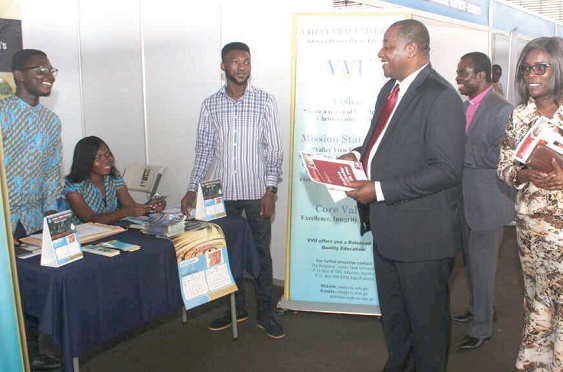
‘Involve private universities in policy discussions’
The President of the African University College of Communications, Dr Koryoe Anim-Wright, has asked for private universities to be involved in policy discussions, dialogue and fora impacting higher education in the country, organised by the Ministry of Education.
Advertisement
Dr Anim-Wright said a case in point was the recently held national Council for Tertiary Education (NCTE) forum to plan the next 20-40 years of tertiary education in Ghana, which the CIU was not invited to participate in.
Dr Anim-Wright made the call at the Council of Independent University’s 11th anniversary celebration and education fair held in Accra yesterday.
It was organised by the Council for Independent Universities (CIU).
She explained that the call, which was the CIU’s position, was in consonance with the government’s own position that it could not provide the higher education needs of the country alone.
That she said made private participation a must and should, therefore, be encouraged and supported to ensure the provision of high quality and equal access to education for all.
Anniversary
The 11th Anniversary celebration dubbed: “Private tertiary institutions affiliation with public universities in Ghana: A bane or a blessing”, drew members of the Council for Independent Universities (CIU), the National Accreditation Board, the Association of African Universities, presidents, rectors, vice chancellors, deans and principals of universities and university colleges, stakeholders and students, to deliberate on challenges facing private universities and their affiliation with the public universities.
The over 20 accredited private universities across the country who were in attendance showcased what they offered to potential students and the general public.
The students engaged with the schools’ representatives to identify potential courses and programmes of interest, while some registered with their preferred universities.
Challenges
On challenges, Dr Anim-Wright mentioned the national posture towards private university education; patronage relationship tendencies exhibited through the mentor role by public universities; issues with affiliation, such as lengthy approval process and institutional branding, as well as the monetisation of affiliation.
“While we appreciate the immense contribution of mentor universities to mentee private universities, there are serious challenges in the relationship, as it currently exists. Some of these challenges include the dual accreditation for programmes, which mandates that the mentee institutions seek additional accreditation for newly introduced programmes from mentor universities, as well as from the National Accreditation Board (NAB),” she said.
She said the strong points of private universities included innovation, flexibility and ability to respond quickly to needs in the labour market and national priorities.
However, she pointed out that the long approval processes by mentoring institutions, before undertaking a similar approval process by the NAB, was a major hindrance to the timely introduction of new programmes.
“This cumbersome process has led to inefficiencies, with private university colleges resubmitting misplaced documents. In the end, the process simply frustrates us, for it undermines our mode of operation and weakens our innovative spirit,” she added.
Dr Anim-Wright pointed out that in circumstances where huge graduate unemployment existed, mounting innovative programmes was an important step to reducing unemployment.
She recommended, therefore, that the private universities should be considered as an infant knowledge industry that needed state support to grow.
“Indeed, a typical private university in Ghana is just about 10 years old and still struggling to survive in a sector that is capital intensive. One example of a proactive way in which the government can assist private university colleges is by modifying the GETFund Act to allow access to infrastructure support,” she added.
For his part, the Chairman of CIU, Nana Prof. Osei K. Darkwa, called for universities to be made completely autonomous so that they could design their own academic programmes, appoint and promote their lecturers while they determined their methods of teaching.
“This will help promote academic excellence and provide the long-cherished academic freedom, to enable them to develop and offer innovative programmes consistent with their visions and missions,” he said.




